
Alfred Elton van Vogt was a Canadian-born science fiction author. His fragmented, bizarre narrative style influenced later science fiction writers, notably Philip K. Dick. He is one of the most popular and influential practitioners of science fiction in the mid-twentieth century, the genre's so-called Golden Age, and one of the most complex.
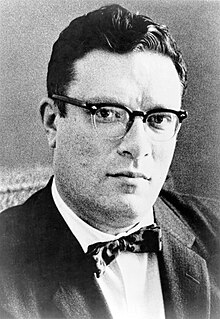
Isaac Asimov was an American writer and professor of biochemistry at Boston University. He was known for his works of science fiction and popular science. Asimov was a prolific writer who wrote or edited more than 500 books and an estimated 90,000 letters and postcards. His books have been published in 9 of the 10 major categories of the Dewey Decimal Classification.
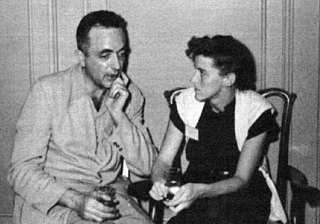
Katherine Anne MacLean was an American science fiction author best known for her short fiction of the 1950s which examined the impact of technological advances on individuals and society.
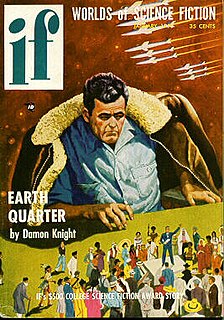
Damon Francis Knight was an American science fiction author, editor and critic. He is the author of "To Serve Man", a 1950 short story adapted for The Twilight Zone. He was married to fellow writer Kate Wilhelm.
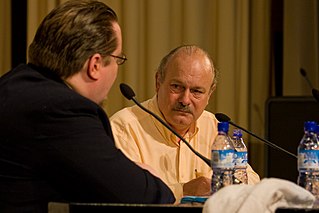
Joe William Haldeman is an American science fiction author. He is best known for his novel The Forever War (1974). That novel, and other of his works, including The Hemingway Hoax (1991) and Forever Peace (1997), have won major science fiction awards, including the Hugo Award and Nebula Award.

Robert Silverberg is an American author and editor, best known for writing science fiction. He is a multiple winner of both Hugo and Nebula Awards, a member of the Science Fiction and Fantasy Hall of Fame, and a Grand Master of SF. He has attended every Hugo Awards ceremony since the inaugural event in 1953.

The World of Null-A, sometimes written The World of Ā, is a 1948 science fiction novel by Canadian American writer A. E. van Vogt. It was originally published as a three-part serial in 1945 in Astounding Stories. It incorporates concepts from the General Semantics of Alfred Korzybski. The name Ā refers to non-Aristotelian logic.
"Common Time" is a science fiction short story by American writer James Blish. It first appeared in the August 1953 issue of Science Fiction Quarterly and has been reprinted several times: in the 1959 short-story collection Galactic Cluster; in The Testament of Andros (1965); in The Penguin Science Fiction Omnibus (1973); and in Isaac Asimov Presents the Great SF Stories.
Orbit was an American long-running series of anthologies of new fiction edited by Damon Knight, often featuring work by such writers as Gene Wolfe, Joanna Russ, R. A. Lafferty, and Kate Wilhelm, who was married to Knight. The anthologies tended toward the avant-garde edge of science fiction, but by no means exclusively; occasionally the volumes would feature some nonfiction critical writing or humorous anecdotes by Knight. Inspired by Frederik Pohl's Star Science Fiction series, and in its turn an influence on Harlan Ellison's Dangerous Visions volumes and many others, it ran for over a decade and twenty-one volumes, not including a "Best-of" collection which covered the years 1966-1976.
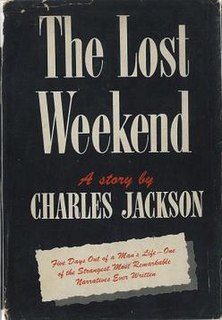
The Lost Weekend is Charles R. Jackson's first novel, published by Farrar & Rinehart in 1944. The story of a talented but alcoholic writer was praised for its powerful realism, closely reflecting the author’s own experience of alcoholism, from which he was temporarily cured. It served as the basis for a film adaptation by the same name in 1945.
"Extempore" is a science fiction short story by American writer Damon Knight. It first appeared in the August 1956 issue of Infinity Science Fiction and has been reprinted twice, in Far Out (1961) and The Best of Damon Knight (1976).

Typewriter in the Sky is a science fantasy novel by American writer L. Ron Hubbard. The protagonist Mike de Wolf finds himself inside the story of his friend Horace Hackett's book. He must survive conflict on the high seas in the Caribbean during the 17th century, before eventually returning to his native New York City. Each time a significant event occurs to the protagonist in the story he hears the sounds of a typewriter in the sky. At the story's conclusion, de Wolf wonders if he is still a character in someone else's story. The work was first published in a two-part serial format in 1940 in Unknown Fantasy Fiction. It was twice published as a combined book with Hubbard's work Fear. In 1995 Bridge Publications re-released the work along with an audio edition.
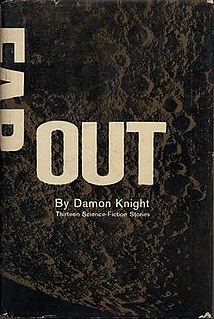
Far Out is a collection of 13 science fiction short stories by American writer Damon Knight. The stories were originally published between 1949 and 1960 in Galaxy Magazine, If Science Fiction and other science fiction magazines. There is an introduction by Anthony Boucher.
"The Last Word" is a science fiction short story by American writer Damon Knight. It first appeared in the February 1957 issue of Satellite Science Fiction and has been reprinted twice, in Far Out (1961) and The Best of Damon Knight (1976).
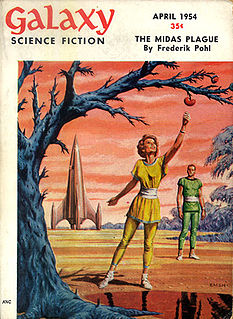
"Special Delivery" is a science fiction short story by American writer Damon Knight. It first appeared in the April 1954 issue of Galaxy Science Fiction and has been reprinted a number of times, in Operation Future (1955), Far Out (1961), and The Best of Damon Knight (1976).
"Not with a Bang" is a science fiction short story by American writer Damon Knight. It first appeared in the winter 1949 issue of The Magazine of Fantasy and Science Fiction and has been reprinted a number of times, including in Far Out (1961), The Best of Damon Knight (1976), 50 Short Science Fiction Tales, and The Eureka Years (1982).

The 1977 Annual World's Best SF is an anthology of science fiction short stories edited by Donald A. Wollheim and Arthur W. Saha, the sixth volume in a series of nineteen. It was first published in paperback by DAW Books in May 1977, followed by a hardcover edition issued in September of the same year by the same publisher as a selection of the Science Fiction Book Club. For the hardcover edition the original cover art of Jack Gaughan was replaced by a new cover painting by Richard V. Corben. The paperback edition was reissued by DAW in 1983 under the variant title Wollheim's World's Best SF: Series Six, this time with cover art by Bernal. A British hardcover edition was published by Dennis Dobson in November 1979 under the variant title The World's Best SF 4.
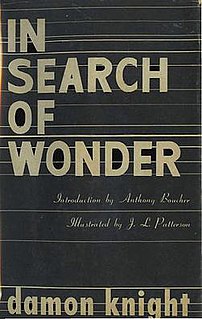
In Search of Wonder: Essays on Modern Science Fiction is a collection of critical essays by American writer Damon Knight. Most of the material in the original version of the book was originally published between 1952 and 1955 in various science fiction magazines including Infinity Science Fiction, Original SF Stories, and Future SF. The essays were highly influential, and contributed to Knight's stature as the foremost critic of science fiction of his generation. The book also constitutes an informal record of the "Boom Years" of science fiction from 1950-1955.

The Best Science Fiction of the Year #6 is an anthology of science fiction short stories edited by Terry Carr, the sixth volume in a series of sixteen. It was first published in paperback by Del Rey Books and in hardcover by Holt, Rinehart and Winston in July 1977.

Cosmic Stories and Stirring Science Stories were two American pulp science fiction magazines that published a total of seven issues in 1941 and 1942. Both Cosmic and Stirring were edited by Donald A. Wollheim and launched by the same publisher, appearing in alternate months. Wollheim had no budget at all for fiction, so he solicited stories from his friends among the Futurians, a group of young science fiction fans including James Blish and C. M. Kornbluth. Isaac Asimov contributed a story, but later insisted on payment after hearing that F. Orlin Tremaine, the editor of the competing science fiction magazine Comet, was irate at the idea of a magazine that might "siphon readership from magazines that paid", and thought that authors who contributed should be blacklisted. Kornbluth was the most prolific contributor, under several pseudonyms; one of his stories, "Thirteen O'Clock", published under the pseudonym "Cecil Corwin", was very successful, and helped to make his reputation in the field. The magazines ceased publication in late 1941, but Wollheim was able to find a publisher for one further issue of Stirring Science Stories in March 1942 before war restrictions forced it to close again.















